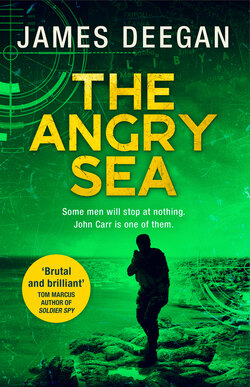Читать книгу The Angry Sea - James Deegan - Страница 25
Оглавление12.
SIXTY KILOMETRES BACK down the coast, in the luxurious, cream leather lounge on the lower deck of the Lucky Lady, Argun Shishani had his mobile phone to his ear once again.
He made two calls.
The first was to a Yemeni security guard on the MS Windsor Castle, who quickly passed on the message to a pair of Moroccan waiters.
The second was to a young Mindanaoan in greasy red overalls on the same ship.
When Farouk Ebrahim finished taking that second call, he looked down at the phone in his hand and thought for a moment.
Perhaps a quick call, to his mother, to tell her that he loved her, and was thinking of her?
But he quickly cast the notion from his mind – he did not want to cloud his mind with unnecessary emotions, and, more importantly, he did not want what he was about to do to come back to his family.
His trainers had warned him repeatedly of the fearsome reach and expertise of the Western intelligence agencies, and he knew that, in the coming days, every call made to and from the Windsor Castle on this voyage would be followed up and analysed.
So, instead, he took a final, longing look at the sea – was it his imagination, or were the waves getting up a little? – and whispered a quick prayer before throwing the mobile overboard into the eternal depths.
His last connection with the material world – the world of men, the world he despised – was gone: now there could be no turning back.
Ebrahim squeezed back out from between the lifeboats and hurried back inside.
First he went to the cabin he shared with an Indonesian oiler.
After a few minutes, he left the cabin and walked back down to the engine room of the Windsor Castle.
First engineer Phil Clarke was standing looking up at the various monitors and LCD panels, clipboard still in hand.
Off to the side, the third engineer was talking an engine cadet through a minor issue they’d had with one of the oil pressure gauges.
No-one paid the young Filipino any notice.
Until he walked up behind Clarke and, without warning, plunged a kitchen knife into his upper back.
The blade slid off the edge of Clarke’s right scapula, bending under the force of the blow, and plunged through his right lung, clipping the edge of his heart, and burying itself in the cartilage where his ribcage met his sternum.
The first engineer fell forward and hit the floor, gasping and dying, blood flowering on his shirt and spurting onto the steel deck.
The motorman calmly looked down at him and then turned round.
The two other men were staring at him in horror.
The third engineer, torque wrench hanging slack in his hand, took a step forwards.
‘What…?’ he said.
But he got no further.
Ebrahim, his mind and body fizzing with adrenalin and hope, raised his arms above his head, as his instructor had shown him, to arm the built-in mercury tilt-switch attached to the suicide vest that he was now wearing underneath his red overalls.
In the event that anyone tried to take him down, that switch would initiate the eight one-kilogram blocks of military-grade C4 plastic explosive, each taped up with approximately two hundred steel ball-bearings, which were sitting in the pouches of the hand-made canvas waistcoat.
Unbeknownst to Ebrahim, the vest contained a further switch, which meant that the device would detonate if he tried to remove it once it was clipped on.
This was designed to deal with any change of heart on the part of the young martyr.
But he had no such change of heart.
‘Allahu akbar!’ he shouted, staring at the two men in front of him. ‘Allahu akbar!’
At the same time, he closed his fist around the button in his hand, which was attached by two feet of copper wire to the electrical detonator on his vest. The wires met, and the contact sent a pulse to the detonator, the resultant explosion in turn initiating the detonation cord linking the blocks of C4. The det cord exploded at 8,000 metres per second, igniting the C4 and spreading 1,600 ball bearings out through 360 degrees with the destructive force of a thousand shotguns.
The explosive energy turned Farouk Ebrahim into a pink mist where he stood.
A millisecond later the molten shrapnel destroyed all of the computers and levers and LCD screens and gauges in that end of the engine room, threw the four Converteam/Rolls-Royce engines instantly offline, and shredded the other men.
They did not even register the flash of the explosion which obliterated them.
